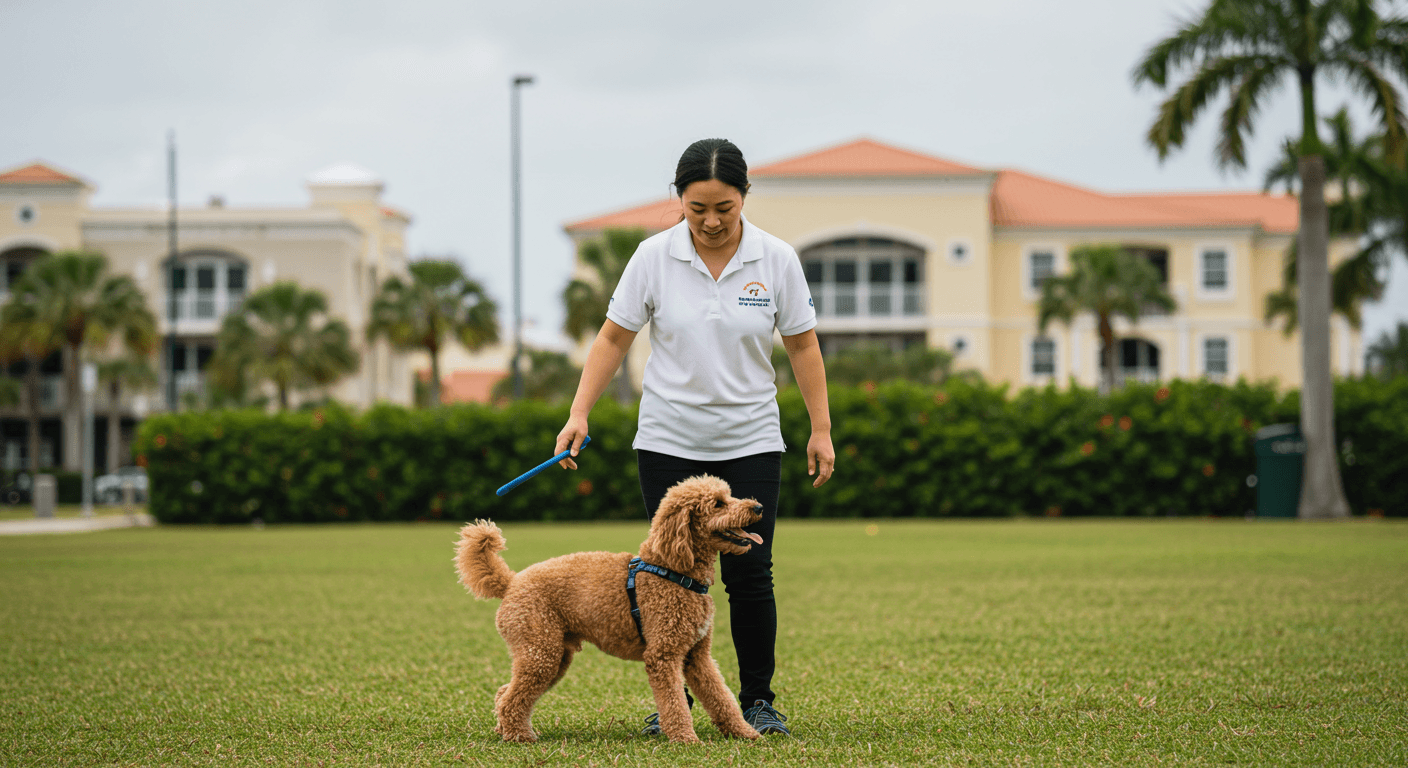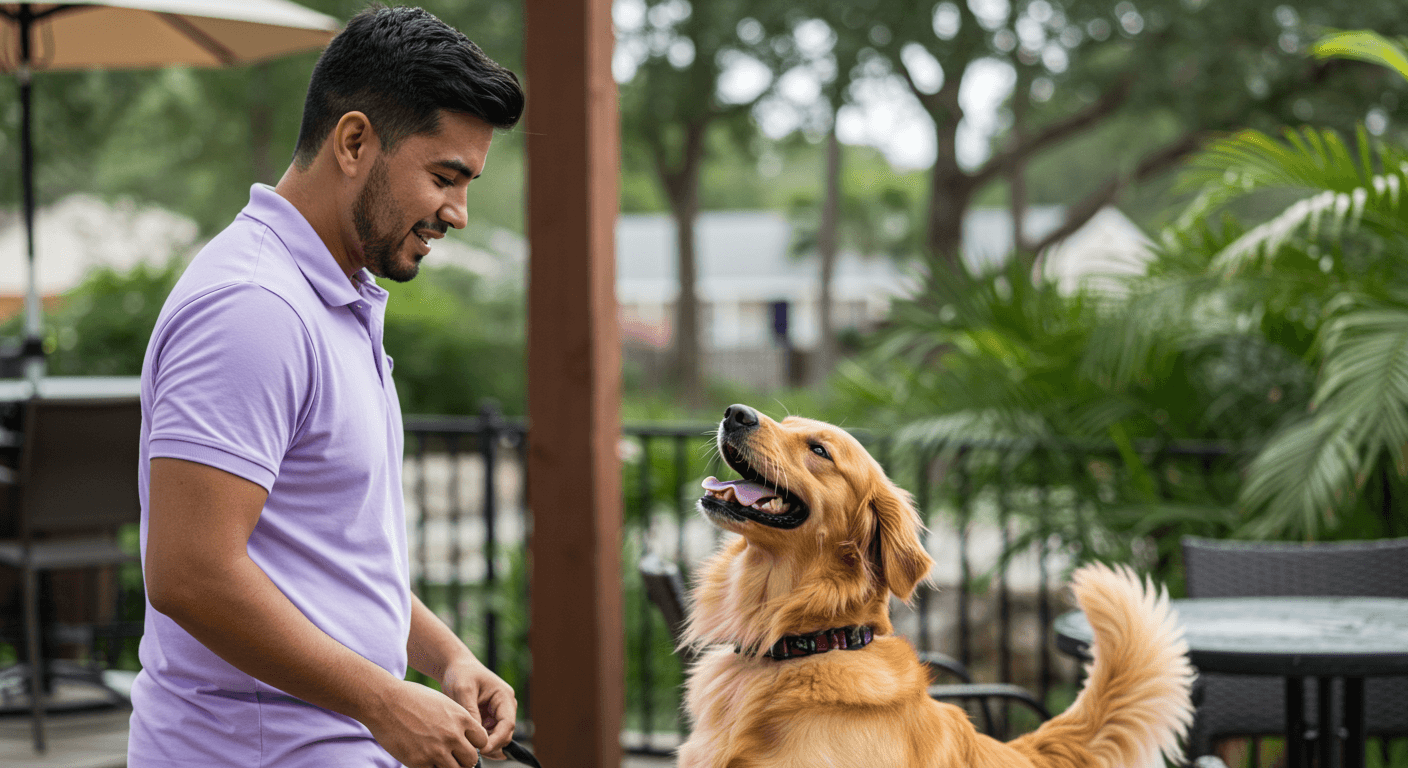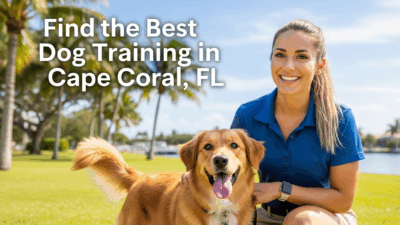Your Complete Guide to Choosing a Dog Trainer in Cape Coral and Surrounding Areas
Living with a dog in Cape Coral means dealing with canals, boat traffic, vacation crowds, and waterfront distractions that most trainers never think about. Your dog needs to stay calm when kayakers paddle past your backyard, keep quiet when neighbors are docking boats, and walk politely through Four Freedoms Park without lunging at wildlife.
Since Cape Coral sits in Lee County, you’ll follow county rules for licensing and leash laws while also respecting the unique challenges of a waterfront community. When you find a professional dog trainer who understands these local details, you’ll get better results both at home and along the Caloosahatchee.
How to Choose the Right Trainer
Start by looking for someone who uses positive reinforcement training and can set realistic goals for your Cape Coral lifestyle. This means your dog should learn to walk calmly past wildlife in Rotary Park, stay focused near busy marina parking lots, and handle encounters with joggers, cyclists, and anglers without drama.
Credentials give you a quick way to compare trainers’ experience levels. Common dog trainer certifications include KPA-CTP, CPDT-KA, or IAABC-CDBC for behavior problems. If your dog has serious aggression issues, look for someone with CBCC-KA or a science-based program like CTC.
In-home dog training works great for puppy manners, door greetings, and canal-side leash skills. Group classes make sense once your dog can focus around other dogs, especially before you try busy spots like Jaycee Park during weekend events.
Common Dog Training Methods Explained

Reward-based methods build the trust you want while creating lasting behavior changes. They also help you follow Lee County’s rules about keeping dogs under control in public spaces and preventing nuisance complaints in densely packed neighborhoods.
Basic obedience covers sit, down, stay, place, recall, and leash training so your dog can handle walks, waterfront restaurant patios, and park visits without pulling or jumping on people. These foundational skills become especially important when you’re navigating boat ramps or crossing busy Pine Island Road.
Puppy training focuses on socialization, potty training, bite control, crate comfort, and early leash skills. Starting with short, positive training sessions prevents bad habits from forming in the first place and helps your dog learn to ignore the constant stimulation of waterfront living.
Behavior modification addresses fear, reactivity, resource guarding, or separation anxiety through careful desensitization and counterconditioning. For serious cases, ask if your trainer works with local veterinarians or can refer you to a veterinary behaviorist.
Private lessons and in-home sessions let you customize everything around your daily routines, whether that’s practicing dock manners or working on quiet behavior when boats pass by. Day training can speed up results when you’re short on time or juggling work schedules.
Dog training classes help your dog practice good manners around other dogs and people. The best group classes give dogs plenty of space, screen participants carefully, and teach calm behavior rather than just excitement.
Specialized training like therapy dog training or service dog training requires extra structure, public-access skills, and a very clear step-by-step program. These training programs demand consistent effort and professional guidance to meet certification standards.
Stay away from trainers who use fear, intimidation, or pain to get results. Humane dog training services are safer for everyone, easier to maintain long-term, and much better for keeping peace with your neighbors in canal-front communities.
Average Cost of Dog Training in Cape Coral FL (Updated for 2025)
Prices around Cape Coral and Lee County depend on the trainer’s experience, how long sessions last, and where the training happens. Here’s what most local pet owners are paying in 2025.
| Service Type | Average Cost (Cape Coral/Lee County) |
|---|---|
| Puppy classes (4-6 weeks) | $140-$260 total |
| Group obedience classes (4-6 weeks) | $150-$285 total |
| Private lessons (60-90 min) | $100-$180 per session |
| In-home coaching packages (4-6 visits) | $400-$850 total |
| Day training (trainer works your dog) | $425-$900 per week |
| Behavior consult for reactivity/anxiety | $140-$240 |
| Board and train (2-4 weeks) | $1,900-$4,200 total |
You’ll probably pay extra travel fees for longer distances within Lee County, and expect higher rates for complex behavior work or aggressive dog training. Board and train programs typically include follow-up sessions to help your dog transition back home.
Make sure you understand what’s included, how the trainer tracks progress, and whether they offer a free consultation or free evaluation before you sign up.
Questions to Ask a Potential Dog Trainer
- What training methods do you use, and how do you keep sessions positive and low-stress?
- What credentials do you have, like CPDT-KSA or KPA-CTP? Do you keep up with continuing education?
- How will you customize the training program for my dog’s specific needs and our Cape Coral lifestyle?
- Do you offer in-home visits, group classes, or day training, and which approach fits my goals best?
- How will we measure my dog’s progress and know when to add more distractions like boat traffic or wildlife?
- What are the total costs, including any travel fees, and what’s your cancellation policy?
- Do you carry liability insurance, and can you show me proof?
- For behavior problems, will you work with my veterinarian if needed?
- What should I practice between training sessions to help my dog keep improving?
Local Cape Coral Rules and Considerations
Cape Coral enforces leash laws and nuisance rules to keep parks and waterfront areas safe for everyone. Lee County follows Florida’s public health requirements too.
Leashes are required in all public spaces except inside designated dog parks. Keep a standard 6-foot leash with you for city parks, greenways, and waterfront paths.
Florida law requires current rabies vaccination for all dogs over four months old. Lee County also requires a county dog license for all dogs, which you can obtain through Lee County Domestic Animal Services. Your license tag must be worn at all times.
Excessive barking can be considered a nuisance under Cape Coral city ordinances, so work with your trainer on alert barking and separation anxiety before neighbors start complaining. This becomes especially important in neighborhoods like Cape Harbour or Tarpon Point where homes are close together.
Florida doesn’t require special licenses for dog trainers, but certified dog trainer credentials give you confidence in their knowledge and skills. If a trainer boards dogs for payment, their facility must comply with state animal welfare standards.
Lee County Domestic Animal Services provides resources for lost pets, microchips, spay and neuter programs, and other county services that benefit dog owners.
Local Cape Coral Resources for Dog Owners
These spots give you great places to practice polite manners, work on recalls, and provide safe enrichment for your dog. Always follow the posted rules and etiquette guidelines.
- Rotary Park Dog Park off Cultural Park Boulevard offers separate areas for large and small dogs with water stations and plenty of shade. Practice recalls and calm greetings during quieter weekday mornings.
- Glover Bight Dog Park near the Midpoint Bridge provides fenced space with a mix of sun and shade areas. The location makes it convenient for residents in southeast Cape Coral and surrounding areas.
- Four Freedoms Park welcomes leashed dogs along the Caloosahatchee waterfront. This is perfect for building focus around boats, wildlife, and families while enjoying river views.
- Jaycee Park allows leashed dogs and offers walking paths where you can practice loose-leash skills near parking lots, picnic areas, and weekend crowds.

FAQs
How much does in-home dog training cost?
Most Cape Coral trainers charge $100-$180 per in-home visit, with discounts available when you buy packages. Behavior problems typically start at the higher end of that range.
Is in-home dog training worth it?
Absolutely, because you’re working on problems exactly where they happen. Your trainer can fix door manners, jumping on guests, canal-side reactivity, and boat traffic reactions right at home, then step outside to practice leash skills on your actual neighborhood sidewalks.
Can you pay someone to house train your dog?
Yes, many trainers offer puppy programs that include potty training, crate routines, and daily schedules. Day training can speed up the process while teaching you how to maintain the progress after the trainer leaves.
What is the 3-3-3 rule for dog training?
This is a helpful timeline for new or adopted dogs: expect about 3 days for your dog to decompress, 3 weeks to learn your routines, and 3 months to feel completely settled. Good training plans work with this natural adjustment period rather than rushing results.
How long will it take to reach my training goals?
Most puppies and friendly adult dogs show solid progress within 4-8 weeks if you practice daily. Fear, reactivity, or aggression typically requires several months of careful behavior modification with gradual increases in difficulty.
What should I bring to group classes?
Pack a flat collar or harness, a 6-foot leash, high-value treats, water, and current vaccination records if your trainer requests them. Leave retractable leashes at home for safety reasons.
What’s the leash law in Cape Coral?
Dogs must be leashed and under control in all public areas except inside designated off-leash dog parks. Keep that 6-foot leash handy for city parks, waterfront paths, and neighborhood walks.
Do I need a dog license in Cape Coral or Lee County?
Yes, Lee County requires all dogs to have a current county license. You can apply online or in person through Lee County Domestic Animal Services. Proof of rabies vaccination is required to obtain the license.
What shots does my dog need in Lee County or Florida?
Rabies vaccination is required throughout Florida for all dogs over four months old. Your veterinarian may also recommend distemper-parvo, leptospirosis, and bordetella based on your dog’s lifestyle and exposure to other dogs.
Are dog trainers required to be licensed in Cape Coral or Lee County or Florida?
No special trainer licenses exist in Florida. Trainers follow normal business regulations, but expert dog trainers often hold certifications from recognized organizations to demonstrate their knowledge and commitment to ongoing education.
Where can I practice off-leash recall?
Use fenced dog parks like Rotary Park Dog Park or Glover Bight Dog Park to keep things safe and legal. Try visiting during quieter hours when you’re starting out to help your dog succeed.
Which dog parks allow training around Cape Coral?
Rotary Park Dog Park and Glover Bight Dog Park both allow off-leash play within their fenced areas. Four Freedoms Park and Jaycee Park welcome leashed dogs for obedience training and socialization practice.
What beaches or trails allow dogs for training?
Cape Coral doesn’t have public beaches, but Fort Myers Beach allows leashed dogs on the beach before 9 AM and after 5 PM from November through April. Bunche Beach Preserve in south Lee County welcomes leashed dogs year-round and offers excellent opportunities for building focus around shorebirds and other wildlife.
How do I help my dog adjust to canal living?
Start by teaching your dog a solid stay command away from the water’s edge. Practice recalls in fenced areas before trusting your dog near open canals. Work with a trainer on desensitization to boats, manatees, and waterbirds so your dog learns to watch calmly rather than react.
What if my dog is reactive to boats or canal traffic?
Reactivity to boats and watercraft is common in Cape Coral because the stimulation is constant. A trainer experienced in behavior modification can help you build positive associations with boat sounds and movement through gradual exposure and rewards. This process takes patience but creates a well-behaved dog who can enjoy waterfront living.
The right combination of thoughtful planning, humane methods, and consistent practice around Cape Coral’s parks and waterfront neighborhoods will help your dog become a confident companion. If credentials matter to you, don’t hesitate to ask about dog trainer certifications and how your trainer stays current with new techniques to help your dog thrive.
